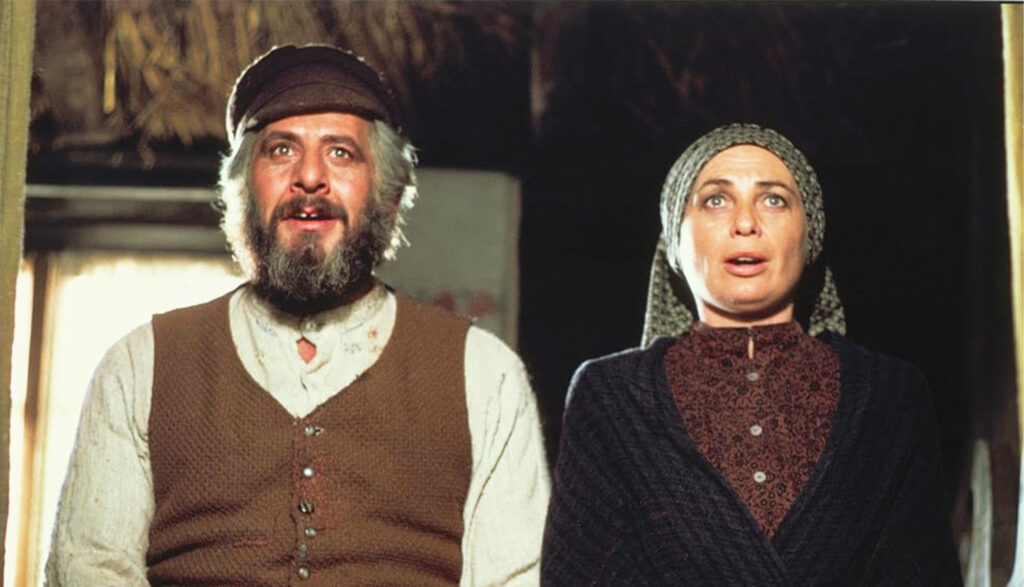
Fiddler on the Roof is a semi-historic musical about the antisemitism in pre-revolutionary Russia. On the other hand, it’s also a film about a faith-filled father struggling to balance Jewish tradition and the marriage of three of his daughters.
Tevye is a poor Jewish milkman with a deeply rooted and conversational relationship with God. Though the small village of Anatevka faces antisemitism from the Russian militia, Tevye knows the Russian constable in their village well, and it is peaceful there.
While the antisemitism in this story doesn’t reach its full climax until the end of the film, Tevye has other pressing issues to address. Namely, his three eldest daughters wish to be married.
Traditionally, a matchmaker arranges the marriage, and the father (in this case, Tevye) approves it. Tevye has no plans to abandon his “Tradition!”
His daughters have other plans.
One asks for his permission, one asks for his blessing, and one just asks him to accept the marriage after the fact. Throughout the story, Tevye wrestles to reconcile his three loves in life: his love for tradition, his love for his daughters and his love for God.
The three-hour musical features lively music, energetic dancing and the story of a father doing his best.
No, Tevye is not a perfect father (as we will see). Still, he graciously lends an ear to his daughters and considers what they are asking, which is an admirable trait.
Tevye has the humility to understand that an agreement is not more important than his daughters’ happiness, that love is a beautiful thing in a marriage and that his once-young daughters are growing up.
Tevye also forms a friendship with the local Russian constable, no small thing considering his deep-seeded hatred for Russia’s Czar.
Quite a few other gems of wisdom are sprinkled throughout the singing, dancing and wagon-wheeling. One song tells us that money is the world’s curse, coupled with the idea that you don’t need money to be happy. Old ways were once new; but if you bend too far, you break. Finally, we hear that an eye for an eye and a tooth for a tooth will make the whole world blind and toothless.
Tevye, the protagonist and our guide of sorts in Anatevka, is a faithful and traditional Jew.
He also seems to be in constant conversation with God, often asking God why. He questions God about his poverty, his struggles and in his parenting, but he always seems to bow to the will of God. Tevye also encourages one of his daughters to leave the future in God’s hands.
The conversational nature of Tevye’s prayers is often humorous. Once, in the middle of complaining, Tevye remembers God is dealing with wars and revolutions and asks, “Am I bothering you?” Tevye also often references “the Good Book,” but he seems to misquote it quite a lot, too.
In various songs and scenes, the biblical stories of Noah, Joseph, Abraham, Moses, Adam and Eve, Solomon, Jacob, Daniel, David, the battle of Jericho, manna from heaven and the plight of the Old Testament Jewish people are each referenced.
In Anatevka, the faithful Jews there honor their Rabbi, honor the Sabbath and honor tradition. And according to Tevye, it is tradition that tells a man “who he is and what God expects him to do.”
A leader in the Russian militia calls the people of Anatevka “Christ-killers.”
While Tevye is a faithful man, he is not a Christian, and so there are a couple moments that run contrary to evangelical beliefs, namely when they say they are still waiting for the Messiah to save them.
The local Jewish synagogue and Russian Orthodox church are both depicted in the film.
When Yente, the matchmaker, hears Tzeitel and Motel played games together as children she says, “from such children come other children.”
Tevye’s daughters fantasize about their matchmaker bringing them the perfect match … before they each decide to make their own matches (radical in the arranged marriage culture). One daughter, however, goes too far. Tevye says that she is dead to him because she betrayed the faith.
Lazar Wolf, the butcher, has blood on his apron when we first see him.
The Russian militia storms the village of Anatevka as a demonstration of power. They knock over wedding tables, raid homes and set a building on fire. Some people are knocked over, but no one is seriously injured.
In another part of Russia at a protest against the government, the militia draws swords on the civilians. We see one protester hit on the head with the blunt side of a sword and fall to the ground.
In a recreation of Tevye’s dream, we see depictions of the undead (though not gorily so).
None.
Tevya and Lazar Wolf drink vodka heavily, later including a whole tavern of men who are celebrating with Tevya. Not surprisingly, Tevya walks home very drunk and wakes up hungover.
People drink wine at the wedding.
Tevye and wife Golde’s marriage consists of a lot of yelling at each other and a few blatant lies along the way as well. (That said, they eventually conclude that they do love each other.)
Tevye sometimes takes a moment to mull an issue over. His other reaction is to yell angrily as he does at almost every character in the movie by the end.
The entire village of Anatevka simmers with a deep hatred for the czar; many Russians have a tyrannical and antisemitic attitude.
Fiddler on the Roof is a classic. It will take you on an emotional journey and leave you singing “l’chaim!”
Among its many themes, this classic musical discusses the tension between embracing and resisting change. Tevye wonders “If you keep changing tradition, where does it stop?” That’s a question worth pondering for us, too.
The film also paints a beautiful picture of an imperfect father, a man who’s struggling to stay faithful to tradition while balancing his deep love for his daughters. Finally, faith—though sometimes depicted as being rigid—also plays a huge role in the way the characters act.
Fiddler on the Roof has a few issues—Tevye’s drinking being one of them, the violence of the czar’s forces being another. Still, by any contemporary measure, Fiddler on the Roof feels delightfully innocent, free of any real stumbles. It’s quite clean, and it could be a great conversation starter for you and your family.


Caleb Gottry is the Plugged In intern for Summer 2024. Caleb studies journalism with a minor in music at Texas Christian University, where he will be a junior in the fall. He loves playing with words, listening to and making music, and spending any spare time with friends or family.